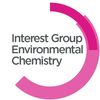Environmental chemistry of water, sediment, soil and air
A group of 39 early career researchers gathered on 14th December 2017 at Burlington House, London to discuss issues relating to the environmental chemistry of water, sediment, soil and air.
The meeting was introduced by the meeting organiser, Dr Tom Sizmur of Reading University, swiftly followed by the first presentation by Camille Peers de Nieuwburgh of Imperial College London, which was on the characterisation of chemical signatures of water associated with hydraulic fracking. She characterised water produced from fracking and related activities and showed that these waters are more likely to be contaminated by the intrusive operations than from natural sources. The next presentation by Erin Losty of Cranfield University was on mixtures of disinfection by-products in drinking water, their toxicity and minimisation. Her talk explained issues surrounding the production of unwanted disinfection by-products, principally highlighting trihalomethanes and haloacetic acids. While many products are known about (circa 600), only a small number are regulated or measured.
The next presentation was a keynote talk from Dr Ailsa Stroud from the DEFRA Air Quality team. Ailsa talked about her work in policy areas such as sea level change, geoengineering, climate change, and air quality. She also talked about her career so far, including a PhD at the University of Cambridge, working at the British Antarctic Survey, and the opportunities that her air quality work has given her (including monitoring air quality at the top of the BT Tower). Before lunch, Ailsa presented the award for the best poster to Sarah Donoghue from Edinburgh University, who had produced a poster on the distribution of lead in soils of the greater Glasgow area.
The meeting was introduced by the meeting organiser, Dr Tom Sizmur of Reading University, swiftly followed by the first presentation by Camille Peers de Nieuwburgh of Imperial College London, which was on the characterisation of chemical signatures of water associated with hydraulic fracking. She characterised water produced from fracking and related activities and showed that these waters are more likely to be contaminated by the intrusive operations than from natural sources. The next presentation by Erin Losty of Cranfield University was on mixtures of disinfection by-products in drinking water, their toxicity and minimisation. Her talk explained issues surrounding the production of unwanted disinfection by-products, principally highlighting trihalomethanes and haloacetic acids. While many products are known about (circa 600), only a small number are regulated or measured.
The next presentation was a keynote talk from Dr Ailsa Stroud from the DEFRA Air Quality team. Ailsa talked about her work in policy areas such as sea level change, geoengineering, climate change, and air quality. She also talked about her career so far, including a PhD at the University of Cambridge, working at the British Antarctic Survey, and the opportunities that her air quality work has given her (including monitoring air quality at the top of the BT Tower). Before lunch, Ailsa presented the award for the best poster to Sarah Donoghue from Edinburgh University, who had produced a poster on the distribution of lead in soils of the greater Glasgow area.
After lunch, Tullus Bergmann from Queen Mary University of London presented research on quantifying mining legacy stocks within sediment deposits in a stream in Cornwall. His work looked at metals in the sediment and explored the possible issues were it to re-mobilise. Collins Gameli Hodoli from Cranfield University then talked about automatic air monitoring devices in Ghana. His research looked at developing and using low cost sensors to analyse air pollutants such as NO, NO2, CO and VOCs as well as PM1, PM2.5 and PM10.
A presentation followed from Sarah Chandler from the University of Brighton, who talked about the use of standalone reagentless sensors for metal analysis in marine environments. Her work is focusing on the development of an arsenic sensor which is accurate and low cost. Dmitriy Berillo from University of Brighton then talked about the use of cryogels-embedded bacteria for the bioremediation of phenol derivatives in aqueous solutions. The principal application for the technology was in the wastewater treatment of chemicals that can be resistant to traditional treatments. The final student presentation was from Matthew Kirby of Imperial College London, who looked at the effect of siderophore desferrioxamine B on uranium precipitation. He specifically highlighted how the naturally occurring bacteria could cause uranium to precipitate out and affect groundwater quality surrounding nuclear facilities, including planned waste disposal facilities.
Our final speaker was Dr Laura Newsome from the University of Manchester. Laura talked about her career in chemistry and how she got her inspiration for science when visiting a museum with her parents. Following a first degree in Environmental Geology, she went to work in environmental consultancy, carrying out risk assessments and remediation of contaminated land. She subsequently spent some time at the Environment Agency looking at radioactivity before going on to do her PhD in the area of bioremediation of radionuclides in groundwater, which included field work in the USA. Her current work is on how microorganisms affect the fate and transport of cobalt in the environment.
To conclude the meeting, Laura presented the prize for the best oral presentation to Sarah Chandler from the University of Brighton.
Our final speaker was Dr Laura Newsome from the University of Manchester. Laura talked about her career in chemistry and how she got her inspiration for science when visiting a museum with her parents. Following a first degree in Environmental Geology, she went to work in environmental consultancy, carrying out risk assessments and remediation of contaminated land. She subsequently spent some time at the Environment Agency looking at radioactivity before going on to do her PhD in the area of bioremediation of radionuclides in groundwater, which included field work in the USA. Her current work is on how microorganisms affect the fate and transport of cobalt in the environment.
To conclude the meeting, Laura presented the prize for the best oral presentation to Sarah Chandler from the University of Brighton.

